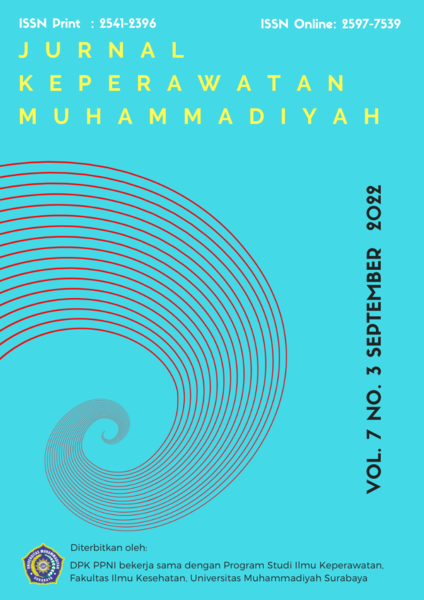Implementasi Permenkes 65/2015 (Standar Pelayanan Fisioterapi) Dan Permenkes 43/2019 (Puskesmas) Wilayah Jawa Timur
DOI:
https://doi.org/10.30651/jkm.v7i3.15001Keywords:
Fisioterapi, preventif dan promotif, puskesmasAbstract
Objective: Â To find out the implementation of Minister of Health Regulation 65/2015 regarding Physiotherapy Service Standards and Minister of Health Regulation 43/2019 regarding Health Centers (Puskesmas) in the East Java region Physiotherapy as a health worker is regulated in the Physiotherapy service standard at the Puskesmas. Health center regulations do not have physiotherapists.Methods: This study uses a descriptive qualitative method, aiming to get a general understanding of reality from the participant's perspective. through in-depth interviews with informants. Sampling is non-probability with the type of purposive sampling. The inclusion criteria were the Head of the City/Regency Health Office whose working area did not yet have physiotherapy services at the Puskesmas and was willing to be an informant. While the exclusion criteria were the Head of the City/Regency Health Office whose work area already had physiotherapy services at the Puskesmas and was willing to be an informant. Sources of data obtained from interviews with informants and secondary data through document studies. The interview included an understanding of the meaning of physiotherapy in relation to services at the Puskesmas. based on Permenkes 65/2015 and what is his opinion about the presence of physiotherapists in several health centers in East Java. Document studies were obtained from the laws and regulations concerning physiotherapy and Puskesmas. Results: Â Most of the informants interpreted physiotherapy as health workers in referral services, namely hospitals and joined in rehabilitation services. Not all informants understand about physiotherapy services at the Puskesmas because in writing there are no physiotherapists in Permenkes 43/2019. Meanwhile, the understanding of rehabilitation is interpreted as secondary and even tertiary services. The services at the Puskesmas are primary services, which are more promotive and preventive. Informants are of the opinion that the presence of personnel in the Puskesmas depends on the policies of each region and also the needs.Addition of personnel at the Puskesmas has an impact on regional budgets and capabilities, besides there is no clear list of service activities.The study of the Permenkes 65/2015 document clearly states the existence of physiotherapy services at the Puskesmas, but in Permenkes 43/2019 it has not been clearly stated that there are physiotherapists.Conclusion: Â The implementation of Permenkes 65/2015 concerning Standards for Physiotherapy Services, especially in Puskesmas in the East Java region is still very minimal, namely 62 out of 968 Puskesmas (6.4%). Permenkes 43/2019 regarding Puskesmas has not stated the presence of physiotherapists, so there is no synchronization of laws and regulations related to physiotherapy services.References
Badan Pusat Statistik Propinsi Jawa Timur, 2020
Databoks Kemenkes, 2021
Marta, Evi dan Kresno Sudarti. (2016). Metodologi Penelitian Kualitatif untuk Bidang Kesehatan. Jakarta: Rajawali Pers.
Permenkes Nomor 80 Tahun 2013 tentang Penyelenggaraan Pekerjaan dan Praktik Fisioterapis
Permenkes Nomor 65 Tahun 2015 tentang Standar Pelayanan Fisioterapi
Permenkes Nomor 43 Tahun 2019 tentang Puskesmas
Sugiyono. (2016). Metode Penelitian Kuantitatif, Kualitatif dan R&D. Bandung: PT Alfabet.
Sugiyono. (2017). Metode Penelitian Kuantitatif, Kualitatif, dan Kombinasi (Mixed Methods). Bandung : Alfabeta, CV.
Undang-Undang Nomor 36 Tahun 2009 tentang Kesehatan
Undang-Undang Nomor 36 Tahun 2014 tentang Tenaga Keshatan
Downloads
Published
2022-09-22
Issue
Section
Full Artikel
License
- Penulis tetap memegang hak atas karyanya dan memberikan hak publikasi pertama kepada jurnal ini yang secara simultan karya tersebut dilisensikan di bawah:Â Creative Commons Attribution-ShareAlike 4.0 International (CC BY-SA 4.0)













